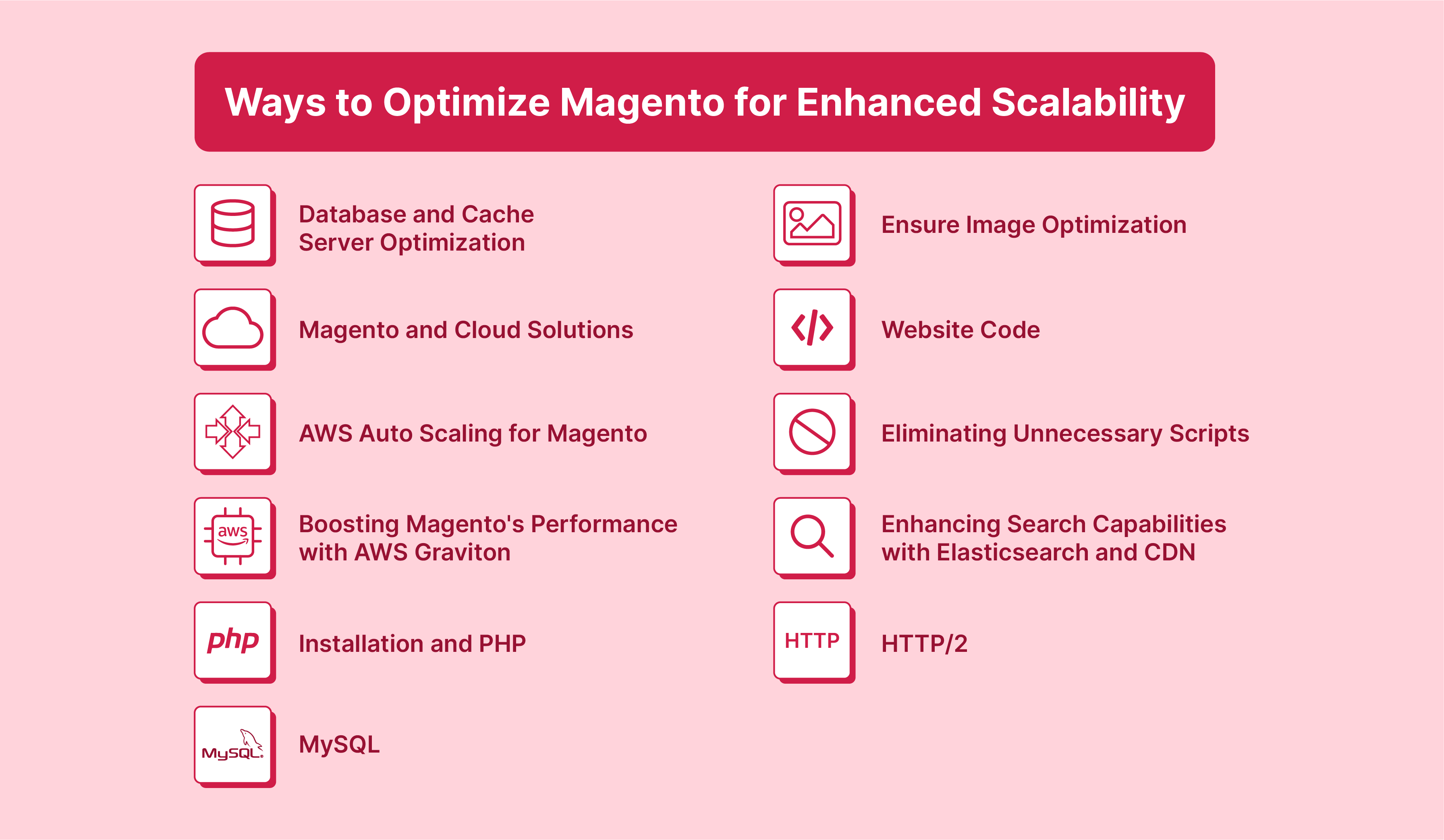
Optimize Magento Scalability for Your Online Store
Magento scalability enhances performance, user experience, and the ability to handle high web traffic volumes. It provides greater flexibility for business growth. Improving scalability involves optimizing server and database settings, implementing effective caching strategies, and utilizing cloud hosting solutions. This guide will cover Magento's scalability features and how to optimize it to create a scalable Magento platform that meets demand and drives growth.
Key Takeaways
-
Explore vertical and horizontal scaling options for Magento to manage varying traffic volumes efficiently.
-
Understand the importance of database maintenance and tools to enhance Magento's performance.
-
Discover the benefits of cloud hosting for auto-scaling and seamless resource allocation.
-
Learn how caching mechanisms like Varnish and Redis can significantly boost your site's speed and responsiveness.
-
Explore tips on PHP, MySQL, image optimization, and code simplification to maximize Magento's scalability.
-
Discover the significance of selecting a reliable Magento hosting provider for store's scalability needs.
What is Magento Scaling?
Magento 2 employs a layered framework that prioritizes scalability. This framework, also utilized in Magento Community Edition, comprises four tiers to facilitate scalable operations:
1. Client Tier
- Utilizes code compression and efficient browser caching mechanisms.
- Implements asynchronous processing during checkout, enabling concurrent tasks and enhancing process efficiency.
2. Page Cache
- Employs effective server-side page caching to store page content, resulting in significantly faster response times for users.
3. Application Tier
- Integrates asynchronous order updates to enhance system responsiveness.
- Improves handling of product updates to increase system efficiency.
4. Database Tiers
- Implements separate master databases for checkout and product data. This segregation optimizes database performance.
Understanding Scalability Options for Your Magento Storefront
When selecting an ecommerce hosting platform for your Magento storefront, it's crucial to consider scalability. Several types of scalability are:
1. Vertical Scaling (Scale Up)

Involves increasing the capacity of an existing server hosting your Magento site by adding more hardware resources, such as processing power, RAM, or storage.
It tends to be costly, requires downtime for upgrades, and lacks fault tolerance. It means if the server experiences issues, your site will too. Vertical scaling is limited by server capacity.
2. Horizontal Scaling (Scale Out)

Includes adding more servers to handle unpredictable traffic spikes. A load balancer often uses it to distribute user requests across the servers.
It's a faster, downtime-free approach that ensures high availability for your Magento site.
3. Manual Scaling

Relies on human intervention to adjust server resources as needed, making it time-consuming and reactive.
In a Magento ecommerce environment, manual scaling struggles to adapt to minute-by-minute traffic fluctuations and may lead to human errors and unnecessary costs.
4. Auto-scaling

Automatically adjusts the number of servers allocated to your Magento site based on real-time requirements.
Magento Cloud hosting facilitates auto-scaling by allowing you to set triggers that respond to resource thresholds, ensuring optimal performance and Magento cost efficiency.
5. Predictive Auto-scaling

Uses current traffic patterns and machine learning to anticipate future traffic.
This proactive approach ensures your Magento site is consistently available and well-provisioned to prevent slowdowns or outages without overpaying for resources.
Magento's Scalability Features
Magento has a rich history of providing versatile solutions for online commerce. Magento 2, backed by Adobe Commerce, caters to businesses of all sizes, offering small and large websites adaptability. Its modular architecture allows for easy expansion, ensuring a scalable foundation. It does this by:
1. Utilizing Statistical and Reporting Tools
Effective statistical tools are vital for optimizing performance and understanding user behavior. Magento 2 stands out by integrating with numerous third-party statistical tools like New Relic, DataDog, MixPanel, Splunk, and Google Analytics. This data-driven approach allows Magento store owners to make informed decisions for scalable growth.
2. Streamlining Database Maintenance
Magento's database structure is designed for scalability and easy maintenance. Developers can efficiently manage and optimize different aspects of the database, preventing issues related to overly large tables. Magento 2's built-in maintenance features contribute to enhanced performance without extensive optimizations.
3. Simulating Current & Future Performance Loads
Scaling a Magento 2 website requires meticulous preparation and testing. Magento offers valuable built-in tools and supports integration with third-party services to evaluate performance under varying loads.
These tests examine critical elements like APIs, database objects, and extensions. Addressing any issues promptly within Magento's modular framework ensures smooth scalability.
4. Harnessing Powerful Caching Tools
Caching plays a crucial role in website performance by storing data for quick retrieval. Magento 2 excels in caching and is compatible with industry-leading tools like Varnish Cache. Effective caching facilitates website expansion without compromising speed. It enables users to add features and algorithms while maintaining performance.
5. Using Limitless Customization Options
Magento's open-source nature allows third-party developers to create extensions that expand its capabilities. These extensions align with Magento 2's modular framework, ensuring scalability as your online store grows. Magento offers extensions that can scale seamlessly alongside your business, unlike many other platforms.
11 Ways to Optimize Magento for Enhanced Scalability

1. Database and Cache Server Optimization
Efficient caching mechanisms like Varnish and Redis play a crucial role in enhancing the performance of your Magento site. They work by storing copies of webpages, reducing the load on your server, and speeding up subsequent requests.
Integrating Redis In Magento 2 improves speed and responsiveness. Memcached, another caching solution, can be configured to utilize more available memory, enhancing overall performance.
2. Magento and Cloud Solutions
Cloud hosting has become the preferred choice for businesses aiming to achieve greater scalability with their Magento stores. Cloud solutions offer a flexible infrastructure and scalable resources, making them well-suited for Magento stores of all sizes.
3. AWS Auto Scaling for Magento
Amazon Web Services (AWS) provides cloud services that greatly benefit your Magento store due to their dynamic auto-scaling capabilities. Your store can automatically adjust its capacity with AWS Auto Scaling for Magento. It handles fluctuations in web traffic, all without requiring manual intervention. It ensures that your store remains responsive and available during traffic spikes.
4. Boosting Magento's Performance with AWS Graviton
AWS Graviton Processors, designed with a focus on performance, are a valuable asset for Magento stores. These processors offer enhanced performance and greater efficiency, which are essential for successful scaling. You can ensure that your Magento store can handle increased demands without compromising performance by utilizing AWS Graviton Processors.
5. Installation and PHP
Hosting your Magento site on AWS is typically delivered from Elastic Compute Cloud (EC2) instances running PHP. To maximize performance, keeping your Magento installation and PHP environment up to date is essential.
Recent versions of PHP are optimized for performance in these environments to help you get the most out of your hosting budget.
6. MySQL
Ensure you use MySQL's latest version to optimize your Magento performance. Magento relies on indexed data in its database to improve performance. Regularly re-indexing your data ensures that it remains current and that your site's performance is not adversely affected.
7. Ensure Image Optimization
Efficiently managing your images before uploading them is essential for optimizing your storage. Store high-resolution product images locally on your computer or office network, and only serve the maximum resolution images necessary for customer viewing.
Implement image resizing to ensure that appropriately sized images are delivered, especially considering the variety of devices your customers may use.
8. Website Code
Inspect your website's code to identify pages and assets that load slowly. Keeping your pages simple by reducing unnecessary plugins and external content will lead to faster loading times. Simplifying your codebase is a critical step in improving overall site performance.
9. Eliminating Unnecessary Scripts
Remove redundant ads and tracking scripts from multiple sources, as they contribute little value and can slow down your website. You can significantly enhance Magento speed and navigation by profiling your website, eliminating unnecessary scripts, and minifying your scripts and stylesheets.
10. Enhancing Search Capabilities with Elasticsearch and CDN
If your site experiences delays in returning search results, consider implementing Magento Elasticsearch to offload search duties. Additionally, if image-heavy product listings are causing performance issues, you can enhance navigation speed by implementing a Content Delivery Network (CDN) like AWS CloudFront. These measures will ensure smoother user experiences.
11. HTTP/2
Upgrade to HTTP/2, a modern update to the HTTP protocol, which offers performance gains when serving your application code. HTTP/2 is compatible with Apache2 and NGINX web servers and can be enabled with a simple configuration change. Enabling compression on your web server is another essential step in optimizing performance.
FAQs
1. What makes Magento a highly capable platform for scalability?
Magento allows seamless integration of various tools and services to help you meet the demand for scalability. Its modular architecture and extensive set of extensions guarantee problem-free scalability. The technical tools provide information crucial for expansion when needed.
2. How does improper database maintenance affect a Magento-based e-commerce site?
A Magento-based e-commerce platform could suffer severe limitations without proper strategy and database maintenance. Neglecting maintenance severely limits the platform’s performance-oriented data usage. It potentially leads to server errors and indexer or cache state issues.
3. What is the first step towards ensuring a scalable platform using Magento?
The first step towards a scalable platform on Magento involves carefully evaluating installed Magento extensions. It’s essential to trim down unnecessary or redundant extensions. Trimming benefits expansion plans and guarantees problem-free scalability in the long run.
4. How do Magento’s customization options aid in scalability?
Magento’s customization options, among numerous others, help businesses build a scalable platform by providing a set of extensions that are aligned with the core framework. These extensions are crucial when expansion is needed, ensuring a seamless experience for visitors and customers.
5. What information can technical tools and services provide for Magento site's optimization?
Technical tools and services for Magento offer valuable insights into the site's performance, helping to identify server errors, assess cache state, and pinpoint areas that require optimization. The information aids in fixing issues and maintaining a high-performing ecommerce platform.
Summary
Magento's scalability ensures adaptable growth for ecommerce platforms. It offers diverse options, automated solutions, powerful database maintenance, and performance evaluation tools. This guide covered various facets of optimizing Magento scalability, from understanding scaling options to leveraging technical tools and services.
Want to scale your growing Magento store without any technical hassles? Check out Magento hosting plans to maximize your platform's scalability and performance.


